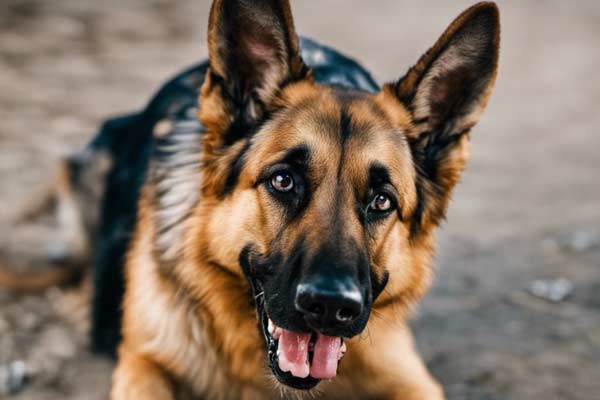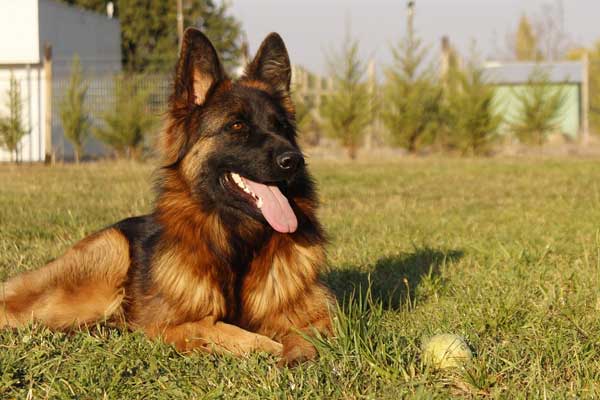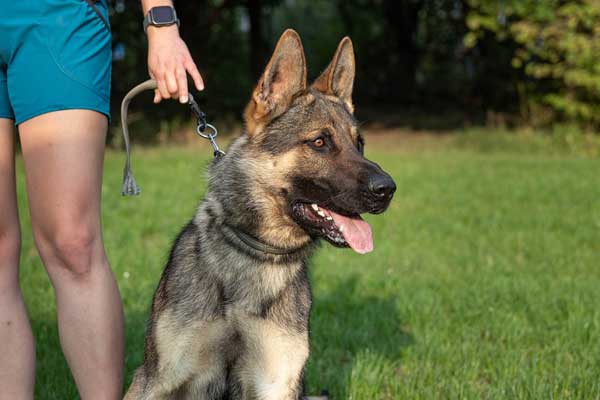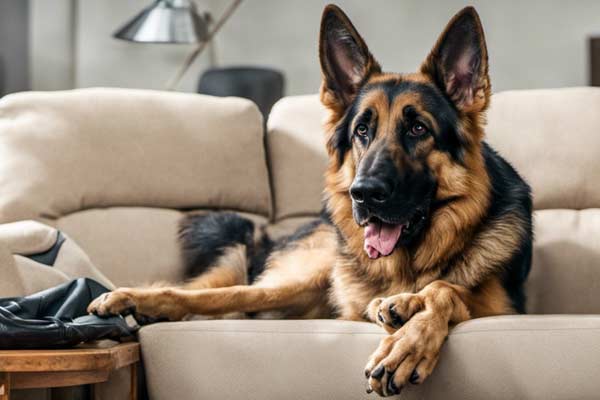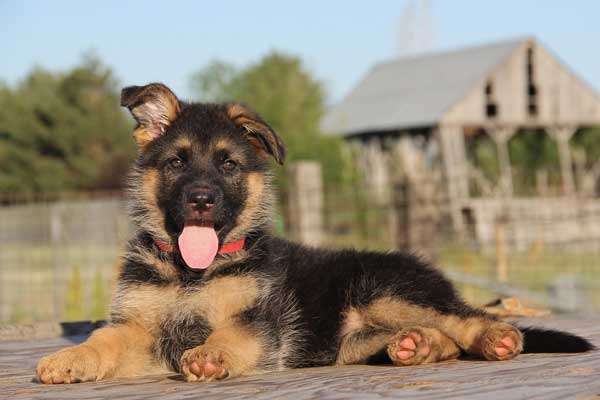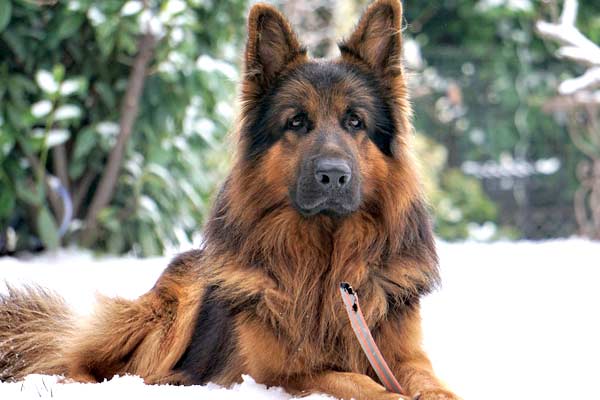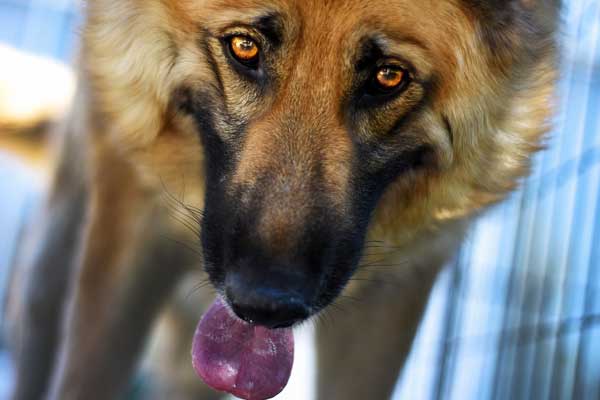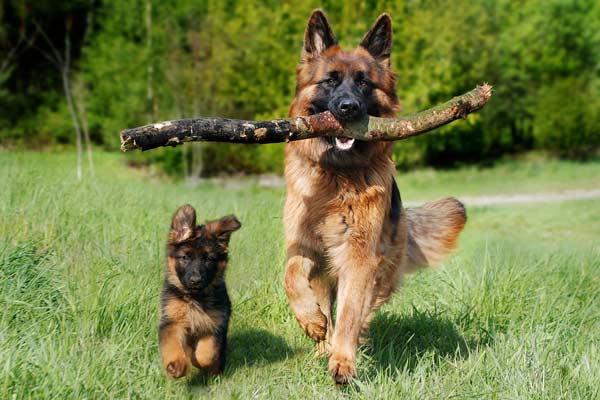Do German Shepherds Chew a Lot? Unravel the Myths and Facts
German Shepherds, renowned for their intelligence, loyalty, and protective instincts, are among the world’s most favored dog breeds. Nonetheless, many owners encounter a prevalent problem with them—excessive chewing.
The question arises: do German Shepherds chew a lot?
The answer is yes, they do, but it is crucial to understand why and how to address this behavior. Chewing is a natural behavior for dogs; German Shepherds are no exception. Puppies chew to relieve the discomfort associated with teething, while adult German Shepherds chew to maintain strong teeth and jaws.
However, excessive chewing can become a behavior problem that can lead to issues such as property destruction. Therefore, understanding why German Shepherds chew and how to manage this behavior is crucial for owners.
Understanding German Shepherd’s Chewing Behavior
German Shepherds, renowned for their powerful jaws and chewing affinity, naturally chew to strengthen their teeth and jaws, alleviate stress, and stimulate their minds. However, unchecked chewing can result in damaged property, causing frustration for owners.
One of the reasons why German Shepherds chew excessively is boredom. These dogs are high-energy and require a lot of mental and physical stimulation. When they don’t get enough exercise or mental stimulation, they can become bored and start chewing on things around the house.
Plenty of exercise and interactive toys can help keep your German Shepherd mentally stimulated and prevent boredom.
Another reason why German Shepherds chew excessively is fear or stress. When these dogs are anxious or stressed, they may turn to chewing to relieve their anxiety. Separation anxiety is a common problem among German Shepherds, and it can lead to destructive chewing when the dog is left alone.
Providing a safe and comfortable environment for your dog, training, and socialization can help reduce anxiety and prevent destructive chewing.
It is important to note that chewing behavior can also be a sign of a health problem, such as dental issues or digestive problems. If your German Shepherd suddenly starts chewing excessively, taking them to the vet for a check-up is vital.
Age and Chewing
German Shepherds are known to be chewers, and this behavior can vary depending on their age.
Puppy Teething and Chewing
Puppies start teething between 3 and 4 months, which can continue until they are eight months old. During teething, they experience discomfort and will chew on anything available.
To avoid damage to your belongings and to alleviate their discomfort, it’s crucial to offer suitable chew toys to satisfy their chewing urges.
Adult German Shepherd Chewing
Once a German Shepherd reaches adulthood, they may continue to chew to maintain strong teeth and jaws. Providing your adult German Shepherd with appropriate chew toys can help satisfy their chewing urge and prevent them from chewing on items not meant for them.
Senior German Shepherd Chewing
As German Shepherds age, their chewing behavior may decrease, and they may lose interest in chew toys. However, providing them with appropriate chew toys is essential to maintain their dental health.
Chewing and Genetic Factors
It is important to note that a German Shepherd’s genetic code can also influence chewing behavior. Some German Shepherds may be heavy chewers due to their breed, while others may be less interested in chewing.
Medical conditions like anemia and diabetes can cause increased chewing in German Shepherds. If your dog’s chewing changes suddenly, see a vet to check for health issues.
Common Items German Shepherds Chew On
German Shepherds are energetic and need plenty of mental engagement. They can become bored and exhibit destructive behavior when they don’t exercise enough.
One of the most common destructive behaviors exhibited by German Shepherds is chewing.
German Shepherds enjoy chewing and will gnaw on almost anything accessible to them.
Some of the most common items that German Shepherds chew on include:
Furniture: German Shepherds love to chew on furniture, especially wooden furniture. They will chew on table legs, chair legs, and even the corners of wooden cabinets.
Toys: German Shepherds love to play with toys, but they also love to chew on them. They will chew on anything from rubber balls to stuffed animals.
Clothes: German Shepherds have been known to chew on clothes, especially if they have a strong scent. They may chew on shoes, socks, or even clothing left on the floor.
Rugs: German Shepherds may chew on rugs, particularly those composed of natural fibers such as wool, and they often target the corners or the fringes of the carpets.
Couch cushions: German Shepherds may chew on couch cushions, especially if they are made of foam or other soft materials.
To prevent your German Shepherd from chewing on unwanted items, keeping them physically active and mentally engaged is essential. Offering a variety of chew toys and bones can also keep them entertained and satisfied.
If your German Shepherd cheats on inappropriate items, you may need to provide them with a crate or playpen to keep them contained when you cannot supervise them.
Why Does Your German Shepherd Chew?
Chewing is a regular activity for dogs, particularly puppies discovering their surroundings. Nonetheless, it can pose an issue when it becomes excessive and damages belongings.
Boredom
One of the most common reasons why dogs chew is because they are bored. If your German Shepherd is not getting enough exercise or mental stimulation, they may turn to chew to entertain themselves. To prevent boredom chewing, ensure your dog gets plenty of exercise and playtime, and provide plenty of toys to keep them occupied.
Anxiety
Anxiety often leads to excessive chewing in dogs, including German Shepherds. When stressed or anxious, they might chew to ease their tension. Triggers for such anxiety can be loud noises, separation from owners, or alterations in their routine. If anxiety seems to be causing your dog to chew, consult your veterinarian for potential treatment solutions.
Hunger
Another reason why dogs may chew excessively is because they are hungry. If your German Shepherd is not getting enough food or is not fed regularly, it may turn to chew to satisfy their hunger. Make sure your dog is getting enough food and is being fed on a consistent schedule to prevent hunger-related chewing.
Attention-Seeking Behavior
If your German Shepherd chews a lot, they might be seeking attention. Ensure you spend quality time with them and reward their good behavior to reduce this habit.
Separation Anxiety
Finally, separation anxiety can also lead to excessive chewing in dogs. If your German Shepherd becomes anxious or stressed when left alone, they may use chewing to cope with their emotions.
To prevent separation anxiety-related chewing, gradually acclimate your dog to being alone and provide plenty of toys and distractions to keep them occupied while you are away.
How to Prevent Chewing
Managing the powerful chewing instincts of German Shepherds is crucial to preventing destructive chewing behavior.
Here are several effective strategies to ensure your German Shepherd avoids chewing on inappropriate items.
Chew Toys for German Shepherds
Giving your German Shepherd proper chew toys would be best to prevent unwanted chewing behavior. KONG toys, bully sticks, and deer antlers are excellent choices.
Bully sticks are entirely digestible and can keep your dog occupied for long periods, and KONG toys offer mental engagement through treat-filling.
Training Your German Shepherd Not to Chew
Training your German Shepherd not to chew on inappropriate items is crucial. Obedience training, teaching the “leave it” command and positive reinforcement are effective ways to train your German Shepherd not to chew on inappropriate items. Avoid punishment or negative reinforcement, which can lead to fear and anxiety.
Exercise and Mental Stimulation
To prevent destructive chewing, German Shepherds need ample exercise and mental engagement. Consistent physical activity helps them release energy, reducing chewing tendencies. Puzzle and interactive toys are excellent for mentally stimulating German Shepherds.
Creating a Dog-Proof Environment
Creating a dog-proof environment is essential to prevent your German Shepherd from chewing on inappropriate items. Keep shoes, socks, and children’s toys out of reach. Crate training can also effectively prevent destructive chewing behavior when your German Shepherd is unsupervised.
Health-Related Chewing Issues
If your German Shepherd is chewing excessively or unusually, it may be linked to medical issues like infections or abnormal behavior. It’s crucial to consult a veterinarian to ensure no underlying health problems.
Using Anti-Chew Deterrents
Anti-chew deterrents such as bitter sprays or taste deterrents can effectively prevent destructive chewing behavior. These deterrents work by making items taste unpleasant to your German Shepherd. However, using these deterrents as a last resort is essential, and consult with your veterinarian before using them.
When to Seek Professional Help
While most German Shepherds are well-behaved and well-trained, some may develop destructive chewing or other destructive behavior. If your German Shepherd is exhibiting destructive behavior you cannot control, it may be time to seek professional help.
German Shepherds often exhibit destructive chewing due to boredom, anxiety, and teething. If your dog is damaging furniture or other items, it might indicate a lack of physical activity or mental engagement.
If your German Shepherd exhibits destructive behavior, it is crucial to address the problem immediately. Ignoring the problem will only worsen it and may lead to more severe behavior problems like aggression.
If you cannot control your German Shepherd’s destructive behavior alone, it may be time to seek professional help.
Certified animal behavior experts and veterinary behaviorists are trained to recognize and manage animal behavior problems. They can help you develop a personalized behavior adjustment plan for your German Shepherd that is clear, concise, and easy to follow.
Medication may sometimes be necessary to help manage your German Shepherd’s behavior. Your veterinarian can help you determine if medicine is essential and prescribe the appropriate remedy.
Seeking professional assistance does not indicate failure; it’s a proactive measure to maintain your German Shepherd’s happiness, health, and good behavior.

